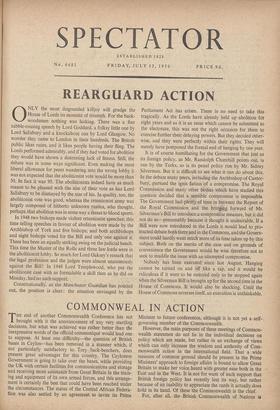REARGUARD ACTION
0 NLY the most disgruntled killjoy will grudge the House of Lords its moment of triumph. For the back- woodsmen nothing was lacking. There was a fine rabble-rousing speech by Lord Goddard, a folksy little one by Lord Salisbury and a knockabout one by Lord Glasgow. No wonder they came to London in their hundreds. The British public likes ruins, and it likes people having their fling. The Lords performed admirably, and if they had voted for abolition they would have shown a distressing lack of fitness. Still, the debate was in some ways significant. Even making the most liberal allowance for peers wandering into the wrong lobby it was not expected that the abolitionist vote would be more than 50. In fact it was 95. The abolitionists indeed have as much reason to be pleased with the size of their vote as has Lord Salisbury to be dismayed by the size of his. In quality, too, the abolitionist vote was good, whereas the retentionist army was largely composed of hitherto unknown rustics, who thought, perhaps,that abolition was in someway a threat to blood sports.
In 1948 two bishops made violent retentionist speeches; this time telling speeches in favour of abolition were made by the Archbishop of York and five bishops; and both archbishops and eight bishops voted for the Bill and only, one against it. There has been an equally striking swing on the judicial bench. This time the Master of the Rolls and three law lords were in the abolitionist lobby. So much for Lord Oaksey's remark that the legal profession and the judges were almost unanimously against the Bill! In 1948 Lord Templewood, who put the abolitionist case with as formidable a skill then as he did on Monday, had no such support.
Constitutionally, aS the Manchester Guardian has pointed out, the position is clear: the situation envisaged by the Parliament Act has arisen. There is no need to take this tragically. As the Lords have already held up abolition lot eight years and as it is. an issue which cannot be submitted to the electorate, this was not the right occasion for them to exercise further their delaying powers. But they decided other- wise, and they were perfectly within their rights. They will merely have postponed the formal end of hanging by one year.
It is of course humiliating for the Government that just as its foreign policy, as Mr. Randolph Churchill points out, is run by the Turks, • so is its penal policy run by Mr. Sidney Silverman. But it is difficult to see what it can do about this. In the debate many peers, including the Archbishop of Canter- bury, pursued the ignis fatuuS of a compromise. The Royal Commission and 'many other bodies which have studied this question decided that a sensible compromise is impossible. The Government had plenty of time in between the Report of the Royal Commission and the. bringing forward of Mr. Silverman's Bill to introducesa compromise measure, but, it did not do so—presumably because it thought it undesirable. If a Bill were now introduced in the Lords it would lead to pro- tracted debate both there and in the•Commons, and the Govern- ment'could hardly want much more of its time taken'up by this subject. Both on the merits of the case and • on grounds of convenience the Government would be wise therefore not to seek to muddle the issue, with an attempted compromise.
Nobody has been executed since last August. Hanging cannot be turned on and off like a tap,' and it would be ridiculous if it were to be restored only to be stopped again when the Silverman Bill is brought upfor the second time in the House of Commons. It would also be shocking. Until the House of Commons reverses itself, an execution is unthinkable.


































 Previous page
Previous page